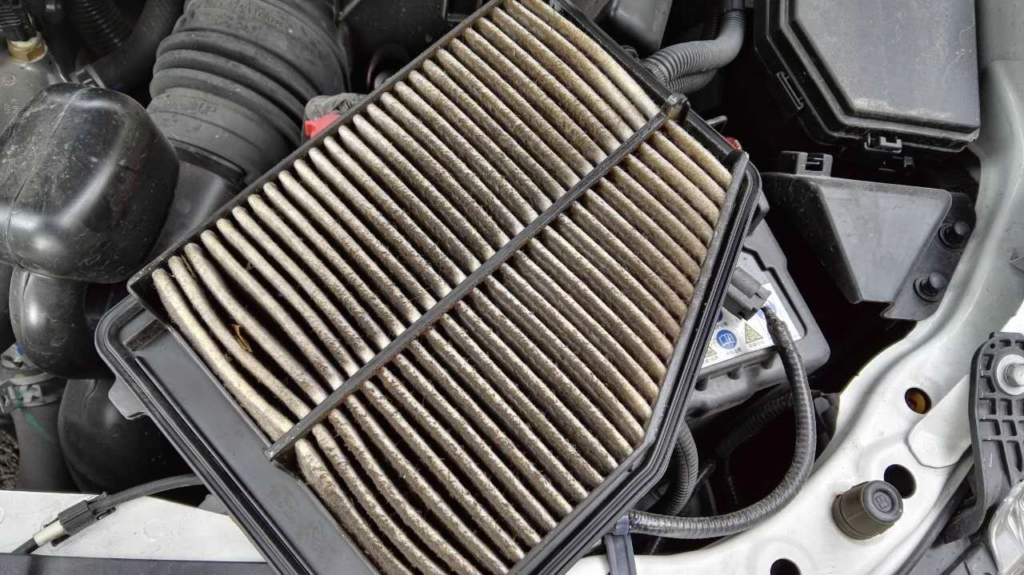
The air filter in your vehicle plays a crucial role in maintaining engine performance, fuel efficiency, and overall longevity. Despite its relatively simple function, neglecting to replace the air filter at recommended intervals can lead to a range of issues that affect both your car’s performance and your wallet. Here’s why regular air filter replacement is essential for your vehicle’s health and efficiency.

Function of the Air Filter:
The air filter serves as a barrier that prevents dust, dirt, pollen, and other contaminants from entering the engine’s intake system. It ensures that only clean air reaches the combustion chambers, where it mixes with fuel for ignition. Clean air is vital for efficient combustion, which directly impacts engine performance, fuel economy, and emissions control.
Signs of a Dirty or Clogged Air Filter:

- Decreased Engine Performance: A clogged air filter restricts airflow to the engine, causing it to work harder to draw in air. This can result in decreased acceleration, sluggish throttle response, and overall reduced engine power.
- Poor Fuel Efficiency: When airflow is restricted due to a dirty air filter, the engine compensates by burning more fuel to maintain performance. This leads to decreased fuel efficiency and increased fuel consumption over time.
- Black Smoke or Excessive Exhaust: An overly dirty air filter can disrupt the air-fuel mixture, causing incomplete combustion and resulting in black smoke emissions from the exhaust. This not only pollutes the environment but also indicates potential engine inefficiencies.
- Unusual Engine Sounds: A clogged air filter may cause unusual engine sounds such as coughing, popping, or a noticeable increase in engine noise. This is often due to irregular combustion caused by improper air-to-fuel ratios.
- Check Engine Light: In modern vehicles equipped with onboard diagnostics (OBD-II), a clogged air filter can trigger the check engine light (CEL) if it affects engine performance or emissions.
Benefits of Regular Air Filter Replacement:
- Improved Engine Performance: A clean air filter allows for optimal airflow to the engine, ensuring efficient combustion and maintaining peak engine performance. This results in smoother acceleration, responsive throttle, and overall better drivability.
- Enhanced Fuel Efficiency: Maintaining a clean air filter reduces the engine’s workload and improves fuel-air mixture consistency. This leads to better fuel combustion efficiency and ultimately improves fuel economy.
- Extended Engine Life: By preventing contaminants from entering the engine, a clean air filter helps reduce wear and tear on engine components. This can extend the lifespan of critical engine parts such as cylinders, pistons, and valves.
- Reduced Emissions: Proper air filtration ensures that the engine burns fuel cleanly and efficiently, minimizing harmful emissions released into the environment. Regular air filter replacement supports environmental sustainability by reducing your vehicle’s carbon footprint.
When to Replace Your Air Filter:
Vehicle manufacturers typically recommend replacing the air filter every 15,000 to 30,000 miles, or as specified in your owner’s manual. However, replacement intervals may vary depending on driving conditions, such as frequent driving on unpaved roads or in dusty environments. Inspect the air filter regularly and replace it sooner if it appears dirty or clogged.
Conclusion:
Regular air filter replacement is a simple yet effective maintenance task that significantly impacts your vehicle’s performance, fuel efficiency, and environmental impact. By ensuring clean air intake to the engine, you not only improve engine performance and extend its lifespan but also contribute to reducing fuel costs and emissions. Incorporate air filter checks into your routine maintenance schedule to enjoy the benefits of a well-maintained and efficient vehicle for years to come. Remember, a small investment in regular air filter replacement can lead to substantial savings in the long run, both in terms of fuel economy and potential engine repair costs.






